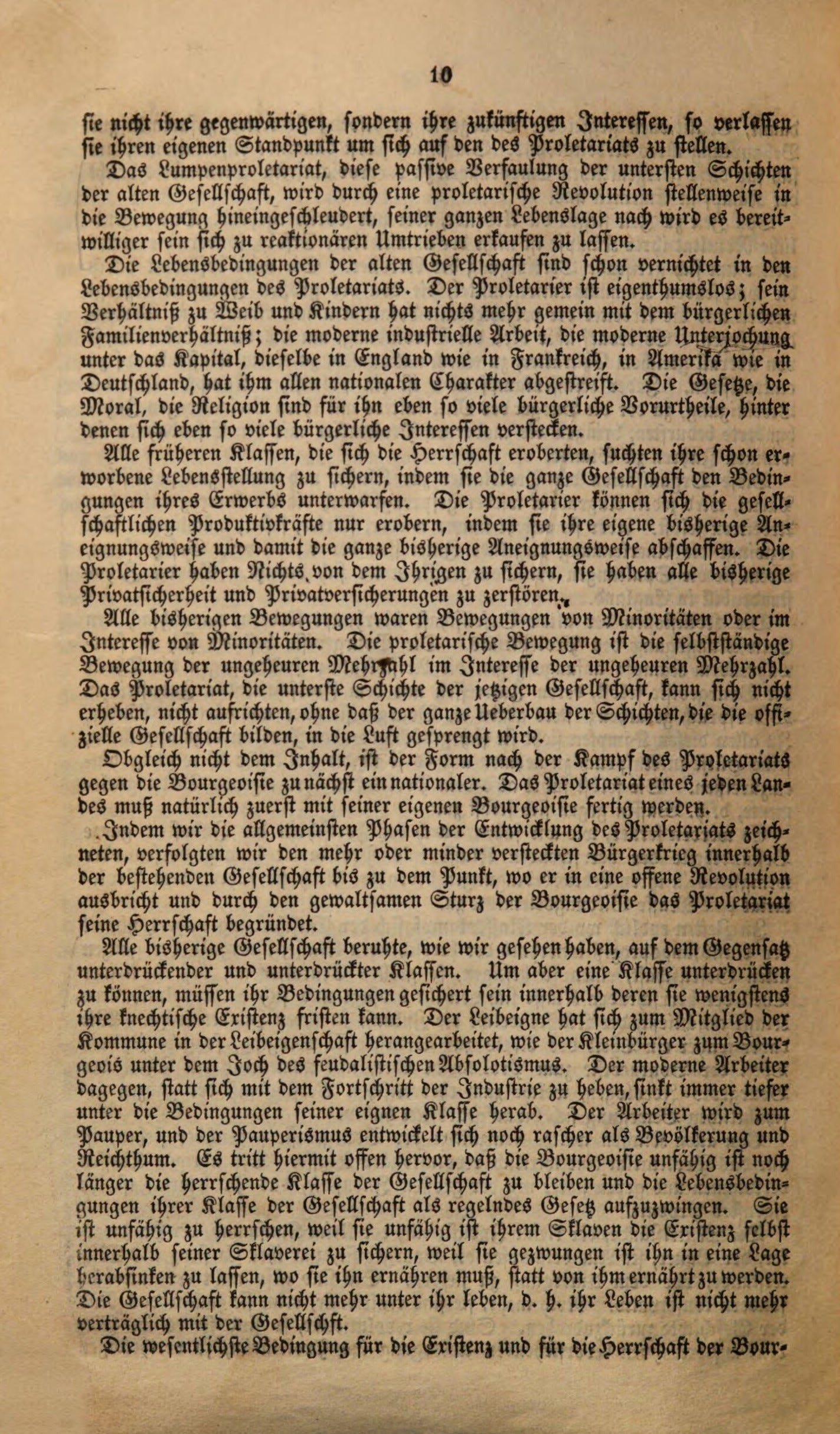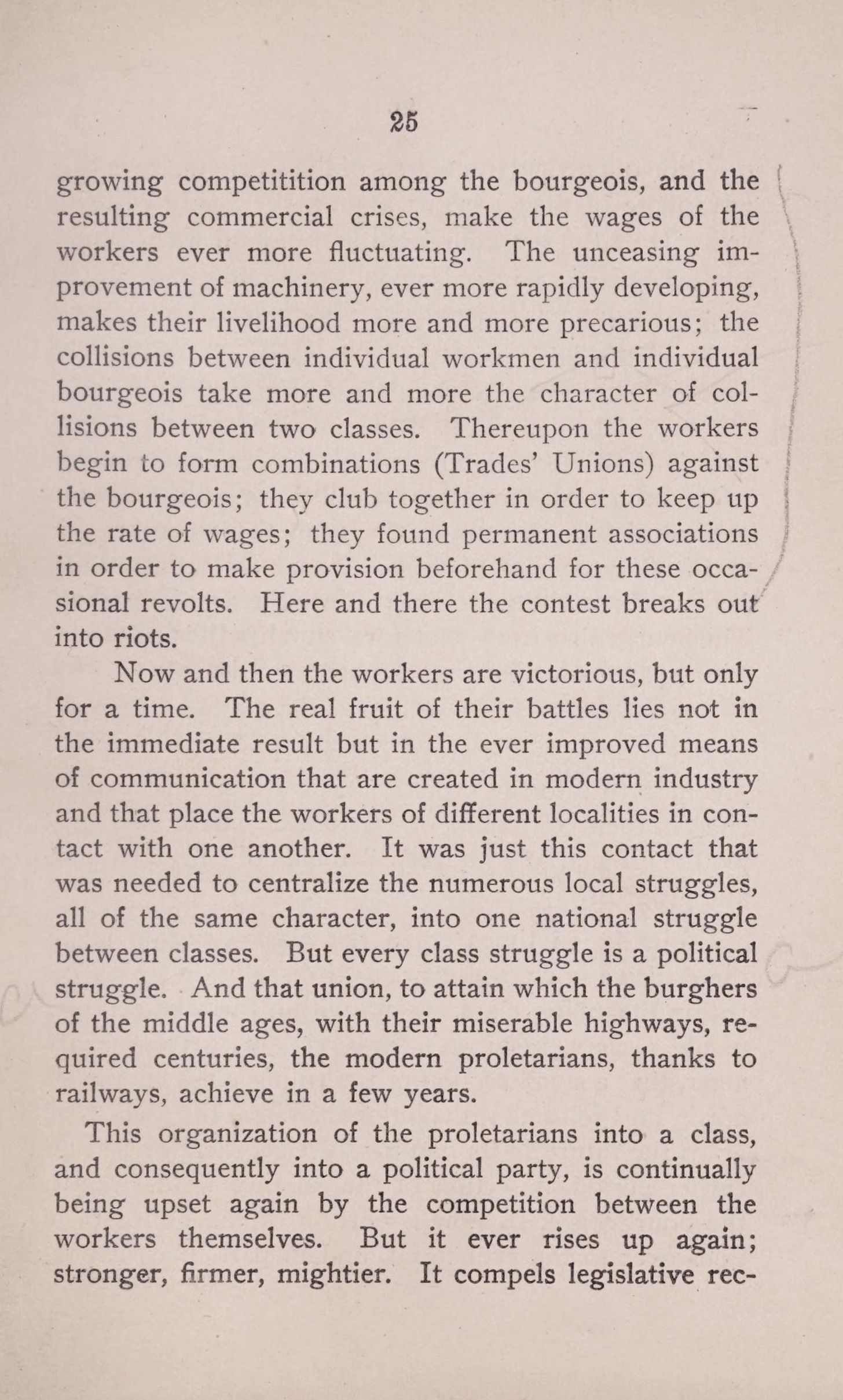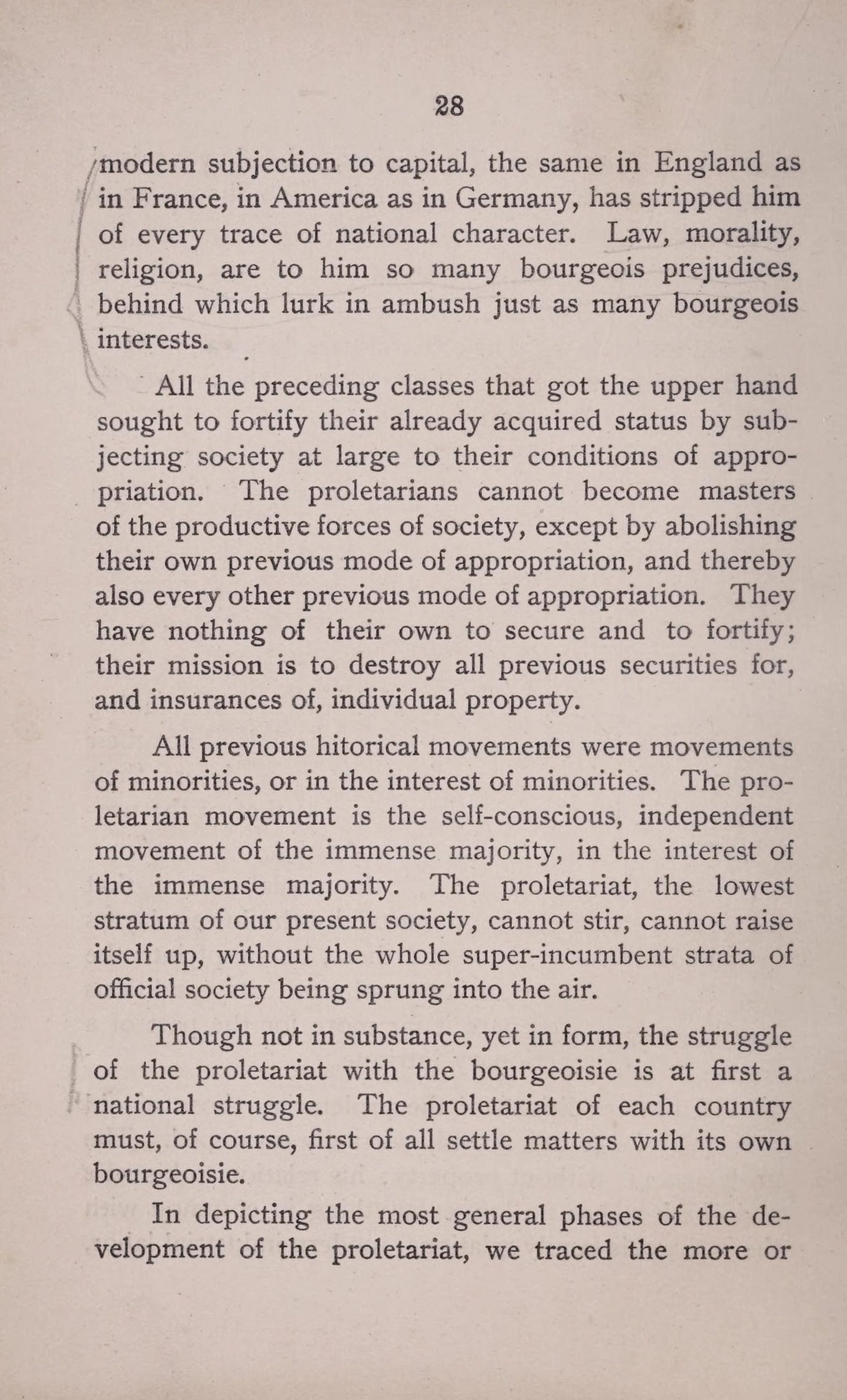Proof of the common, collective nature of fascism with Marx referring to national struggles in the Communist Manifesto.
With the left projecting their fascism, this proves that one of their favourite canards is in this infamous work.
It’s always been a staple of leftist lore to claim that fascism is difficult to define. Thus, they can use that reason to apply the label to whatever the Pro-freedom Right is doing at the moment in an ever-self-fulfilling prophecy. Anti-liberty leftist lies on this labeling centre around subjective criteria that cannot be quantified, and thus cannot be disproved.
When in fact, as an economic system, fascism can easily be defined as socialism with a capitalist veneer.
Where socialism sought totalitarian control of a society’s economic processes through direct state operation of the means of production, fascism sought that control indirectly, through domination of nominally private owners. Where socialism nationalized property explicitly, fascism did so implicitly, by requiring owners to use their property in the “national interest”—that is, as the autocratic authority conceived it. (Nevertheless, a few industries were operated by the state.) Where socialism abolished all market relations outright, fascism left the appearance of market relations while planning all economic activities. Where socialism abolished money and prices, fascism controlled the monetary system and set all prices and wages politically. In doing all this, fascism denatured the marketplace. Entrepreneurship was abolished. State ministries, rather than consumers, determined what was produced and under what conditions.
[Emphasis added]
Anti-liberty leftists will rarely, if ever mention this critical characteristic of fascism, simply because it single handily destroys the perennial leftist big lie that this collectivist, authoritarian ideology with a myriad of similar attributes to communism is somehow ‘far-right.’
Instead of utilizing this logical explanation, they try to pretend that it’s a difficult ideology to define, and either avoid defining it or throw a bunch of alleged defining characteristics against the wall and hope one sticks. One of their perennial favourites is nationalism or being nationalistic because it’s a subjective rather than objective characteristic, as explained in this Encyclopedia Britannica article: What are some common characteristics of fascism?
Although fascism is a notoriously difficult ideology to define, many 20th-century fascist movements shared several characteristics. First, these movements sourced their political strength from populations experiencing economic woes, real or imagined. Fascists tended to capitalize on these economic anxieties by shifting the blame away from government or market forces. Jews, immigrants, leftists, and other groups became useful scapegoats. Redirecting popular anger toward these people would, in theory, rid a country of its ailments.
To unify a country, fascist movements propagated extreme nationalism that often went hand in hand with militarism and racial purity. The prosperity of a nation depended on a unified polity that put the group’s welfare above the individual’s. A strong, vigilant military was considered necessary to defend these group interests. And for some fascists “the group” was defined not by territorial boundaries but by racial identity. Nazism constituted the most insidious form of racial-purist fascist nationalism.
[Emphasis added]
Hence, we bring you two quotes from one of the most infamous books in history from Karl Marx: Manifest der Kommunistischen Partei and two quotations on the nationalen Kämpfen national struggles of the proletariat.
Manifest der Kommunistischen Partei : veröffentlicht im Februar 1848
Creators Marx, Karl; Engels, Friedrich Date 1848
Obgleich nicht dem Inhalt, ist der Form nach der Kampf des Proletariats
gegen die Bourgeoisie zunächst ein nationaler. Das Proletariat eines jeden Lan-
des muß natürlich zuerst mit seiner eigenen Bourgeoisie fertig werden.
Although not in content, in form is the struggle of the proletariat
against the bourgeoisie at first a national one. The proletariat of every country
it must, of course, first deal with its own bourgeoisie.
[Emphasis added]
Die Kommunisten unterscheiden sich von den übrigen proletarischen Parteien
nur dadurch, daß einerseits ſie in den verschiedenen nationalen Kämpfen der Pro-
letarier die gemeinsamen, von der Nationalität unabhängigen Interessen des
gesammten Proletariats hervorheben und zur Geltung bringen, andrerseits da-
durch, daß sie in den verschiedenen Entwicklungs-Stufen, welche der Kampfzwi-
schen Proletariat und Bourgeoisie durchläuft, stets das Interesse der Gesammt=
Bewegung vertreten.
The Communists are different from the other proletarian parties
only by the fact that, on the one hand, they are involved in the various national struggles of the
the common interests of the country, independent of nationality,
of the proletariat as a whole, on the other hand,
that in the various stages of development which the struggle between the two
proletariat and bourgeoisie, the interest of the whole=
movement.
[Emphasis added]
Later editions published in 1898 had slightly different wording in these sections, but they continued with the ‘national struggle’ language:
Chapter I. Bourgeois and Proletarians
Now and then the workers are victorious, but only for a time. The real fruit of their battles lies, not in the immediate result, but in the ever-expanding union of the workers. This union is helped on by the improved means of communication that are created by modern industry, and that place the workers of different localities in contact with one another. It was just this contact that was needed to centralise the numerous local struggles, all of the same character, into one national struggle between classes. But every class struggle is a political struggle. And that union, to attain which the burghers of the Middle Ages, with their miserable highways, required centuries, the modern proletarian, thanks to railways, achieve in a few years.
[Emphasis added]
Though not in substance, yet in form, the struggle of the proletariat with the bourgeoisie is at first a national struggle. The proletariat of each country must, of course, first of all settle matters with its own bourgeoisie.
[Emphasis added]
Thus, we see that while the left likes to lie and deflect the definition argument over fascism into national issues, these were also present in the original Manifest der Kommunistischen or Communist Manifesto.
Finally, we would also like to note the academic paper that explains: How and Why Fascism and Nazism Became the “Right”
Abstract
The Left has been represented by various currents that have historically been very aggressive toward each other because they used different tactics and strategies to achieve socialism. Like many intellectuals, revolutionary leftists did not get along with each other very often. Since the inception of Marxism, which is the doctrine of communism—an extreme and distinctive flavor of socialism—the far Left has portrayed adherents of less revolutionary ideologies as enemies of the working people. The followers of evolutionary socialism—the Social Democrats—were accused by the communists of betraying the proletariat. Non-Marxist currents of socialism, such as Fascism and National Socialism, were excluded from the socialist camp and put on the right wing by Marxist-Leninist propaganda. Stalinist political science became a benchmark that set markers to distinguish between the genuine Left and the Right. This article shows the origin and historical background of the artificial shift of Fascism and National Socialism to the right side of the political spectrum.
[Emphasis added]
While the common traits between collectivist, authoritarian ideologies of Communism and fascism have been obvious to everyone for decades, as in this quotation from Arthur M. Schlesinger Jr., Associate Professor of History at Harvard in the Sunday, April 4, 1948 edition of the New York Times Magazine:
In certain basic respects - a totalitarian state structure, a single party, a leader, a secret police, a hatred of political, cultural, and intellectual freedom - fascism and communism are clearly more like each other than they are like anything in between.
Anti-liberty leftists would always claim that since they were rivals, the collectivists of National Socialism and fascism were somehow, someway not on the left. But we see that merely looking at the documentation destroys these ever-shop-worn leftist lies – as is always the case.







